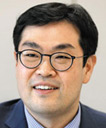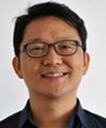주메뉴
- About IBS 연구원소개
-
Research Centers
연구단소개
- Research Outcomes
- Mathematics
- Physics
- Center for Theoretical Physics of the Universe(Particle Theory and Cosmology Group)
- Center for Theoretical Physics of the Universe(Cosmology, Gravity and Astroparticle Physics Group)
- Center for Exotic Nuclear Studies
- Center for Artificial Low Dimensional Electronic Systems
- Center for Underground Physics
- Center for Axion and Precision Physics Research
- Center for Theoretical Physics of Complex Systems
- Center for Quantum Nanoscience
- Center for Van der Waals Quantum Solids
- Chemistry
- Life Sciences
- Earth Science
- Interdisciplinary
- Center for Neuroscience Imaging Research(Neuro Technology Group)
- Center for Neuroscience Imaging Research(Cognitive and Computational Neuroscience Group)
- Center for Algorithmic and Robotized Synthesis
- Center for Genome Engineering
- Center for Nanomedicine
- Center for Biomolecular and Cellular Structure
- Center for 2D Quantum Heterostructures
- Center for Quantum Conversion Research
- Institutes
- Korea Virus Research Institute
- News Center 뉴스 센터
- Career 인재초빙
- Living in Korea IBS School-UST
- IBS School 윤리경영


주메뉴
- About IBS
-
Research Centers
- Research Outcomes
- Mathematics
- Physics
- Center for Theoretical Physics of the Universe(Particle Theory and Cosmology Group)
- Center for Theoretical Physics of the Universe(Cosmology, Gravity and Astroparticle Physics Group)
- Center for Exotic Nuclear Studies
- Center for Artificial Low Dimensional Electronic Systems
- Center for Underground Physics
- Center for Axion and Precision Physics Research
- Center for Theoretical Physics of Complex Systems
- Center for Quantum Nanoscience
- Center for Van der Waals Quantum Solids
- Chemistry
- Life Sciences
- Earth Science
- Interdisciplinary
- Center for Neuroscience Imaging Research(Neuro Technology Group)
- Center for Neuroscience Imaging Research(Cognitive and Computational Neuroscience Group)
- Center for Algorithmic and Robotized Synthesis
- Center for Genome Engineering
- Center for Nanomedicine
- Center for Biomolecular and Cellular Structure
- Center for 2D Quantum Heterostructures
- Center for Quantum Conversion Research
- Institutes
- Korea Virus Research Institute
- News Center
- Career
- Living in Korea
- IBS School
News Center
| Title | IBS Center to host session on CRISPR Genome Editing in upcoming WCSJ | ||||||||||||||||||||||||
|---|---|---|---|---|---|---|---|---|---|---|---|---|---|---|---|---|---|---|---|---|---|---|---|---|---|
| Name | Department of Communications | Registration Date | 2015-06-08 | Hits | 3330 | ||||||||||||||||||||
| att. |
 36.jpg
36.jpg
|
||||||||||||||||||||||||
|
IBSCenter to host session on CRISPR Genome Editing in upcoming WCSJ The Center forGenome Editing will produce a session discussing key features and developmentsof CRISPR, featuring three keynote speakers June00, 2015 Jin-Soo Kim,director of the Center for Genome Editing at the Institute for Basic Science(IBS) will host a session titled “CRISPR Genome Editing in Medicine andBiotechnology” at the upcoming World Conference for Science Journalist (WCSJ)to be held in Seoul, South Korea at Coex from June 8to 12. CRISPR (ClusteredRegularly Interspaced Short Palindromic Repeat) genome editing technology hasbeen successfully used to create genetically modified plants and animalsincluding non-human primates. The technology could help to battle incurablediseases like cancer and AIDs. It works by targeting genetic modifications incells and whole organisms using programmable nucleases that target and severinfected DNA in a sequence-specific manner. CRISPR-Cas9 isan offset of CRISPR and could be used a tool used to manipulate the DNA ofplants, livestock and even humans. As this technology could potentially berevolutionary for mankind, it is not without controversy. Professor XingxuHuang of Shanghai Tech University, who is one of the speakers in the session, iscurrently seeking permission from his institution’s ethics committee to try togenetically modify discarded human embryos. He previously modified embryos thatdeveloped into live monkeys. The Chinese scientist recently told Nature that the technique “gives lots ofpotential for its application in humans.” ConverselyProfessor Tetsuya Ishii, from Hokkaido University, has led various policydiscussions on the regulations of genetically modified organisms (GMO) andhuman germline editing. Professor Ishii is an expert on science policy and iscurrently studying bioethics, focusing particularly on the relationship betweensociety and biotechnology These two prominentexperts will discuss progress and share their insights into the future directionof CRISPR technology. The session will take place on June 9 at 2 PM as one ofthe parallel sessions and will last for approximately 90 minutes. Each keynote willend with a Q&A, enabling participants to take the discussion further. Notes for editors - Director Jin-soo Kim Director Kim is the co-founder ofToolGen Inc., a Korean biotechnology company established in 1999. He publishedthe paper on CRISPR-Cas9 in Nature Biotechnology in 2013, drawing the attentionof international science community. On March 2014, he established the Centerfor Genome Editing at IBS, a key research institute in the InternationalScience and Business Belt (ISBB) in South Korea. - World Conference for Science Journalists The World Conference of ScienceJournalists (WCSJ) is one of the biggest global events in science journalism,and is a gathering of approximately 1200 journalists covering science andmedical issues, as well as international experts. WCSJ, which is marking its 9th conference in 2015,consists of a wide variety of programs that aim to expand the horizons ofparticipants from different backgrounds through lively discussions. Theconference will take place in COEX, Seoul, South Korea and run from June 8to 12. - For further information or to requestmedia assistance, please contact: Mr. Shi Bo Shim, Head of Department ofCommunications, Institute for Basic Science (+82-42-878-8189; sibo@ibs.re.kr)or Ms. Sunny Kim, Department of Communications, Institute for Basic Science(+82-42-878-8135; Sunnykim@ibs.re.kr) - About the Institute for Basic Science(IBS) Session
Session Participants
|
|||||||||||||||||||||||||
| Next | |
|---|---|
| before |
- Content Manager
- Public Relations Team : Yim Ji Yeob 042-878-8173
- Last Update 2023-11-28 14:20

















